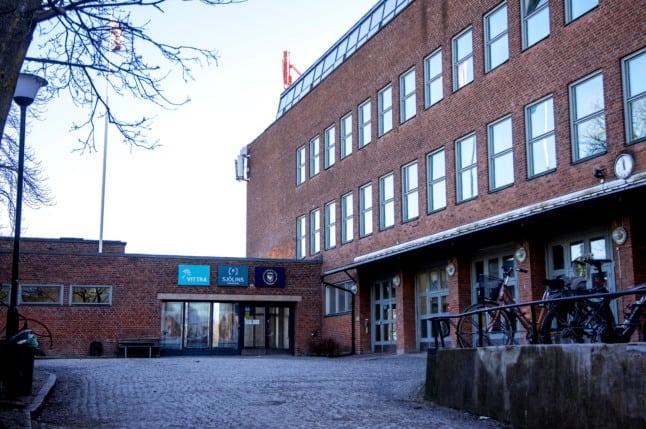Sweden's selective ban on religious schools singles out Islamic ones
Closing Islamic schools is a political decision made with anti-Islamic intentions, according to a Swedish politician.
-

Römosseskolan, an Islamic school in Gothenburg, was shut down by the Schools Inspectorate. (TT)
The Swedish government continues to shut down Islamic academic institutions despite the fact that many of them are among the best-performing schools in the nation in an effort to promote "anti-Islamic rhetoric" and "stop privatization" in education.
The Nordic nation's former Educational Minister, Lena Axelsson Kjellblum, stated at a press conference earlier this year that her administration had introduced a bill to "prohibit the establishment of so-called independent religious schools."
The legislation effectively prohibits schools from growing by adding more students or opening new locations starting in 2024.
#Europe has witnessed a wave of #Islamophobic activity. #Germany indicated that 83 #Islamophobia crimes were recorded in the first quarter of this year.#France has recorded a 38% increase in anti-#Muslim attacks in 2021.
— Al Mayadeen English (@MayadeenEnglish) June 12, 2022
More details here 👇 pic.twitter.com/bpyworyFsf
The legislation has only targeted Islamic schools thus far, which has led to a backlash from Muslim organizations, researchers, and educational institutions who confirm that the decision to close Islamic schools was not driven by subpar academic performance or other teaching issues, but rather by political anti-Islamic motives.
According to Mohamed Amin Kharraki, the head of the independent Muslim school Framstegsskolan in the Stockholm suburb of Ragsved, about 20 schools that identify as Islamic or that are owned by Muslims are being closed, with the remaining three schools defending themselves in court.
The nation's school inspection agency made the decision to close Framstegsskolan public in May of last year. Nevertheless, the school was successful in its appeal, and the administrative court ruled that the decision should stand while the appeal is being heard.
Decisions made on 'conspiratorial claims'
The Swedish domestic security service SAPO's report, which contained "conspiratorial claims" about the Muslim Brotherhood organization, hidden agendas, and alleged terror labels that have perplexed some researchers, served as a fabricated excuse to close the school.
"This further shows that we have a social climate where Muslims are exotified and made suspicious. It is a shame that Sapo, of all authorities, has fallen into that pit," said Poljarevic, who is a lecturer in Islamic theology and philosophy at Uppsala University.
Islamic preschools are also caught in the crosshairs.
"Terrorist" preschools?
Due to SAPO's assertions that kids were allegedly at risk of radicalization, Saimagarden, a Framstegsskolan-operated preschool in Stockholm's Akalla neighborhood, was set to close last August. However, the court reversed the decision, so the preschool is still open pending the outcome of the case.
Kharraki claimed that SAPO had only cited "secret" sources and had not made any specific accusations against either school in its report.
Underlining the danger posed by the inspectorate's argument, he said if a school is accused of putting children at risk of radicalization, with no actual proof or past incident, then it's "very hard for you, as an accused party, to defend yourself, actually, because it's nothing that has actually happened. It's something that may happen."
However, the school inspectorate never visited Framstegsskolan to investigate the alleged radicalization and has refused to question SAPO's report, according to Kharraki.
Anti-Islam agenda
The top official for the Nyans political party in the southernmost Skane county and a board member, Sead Busuladzic, said the closures of the schools had nothing to do with education and everything to do with the current anti-Muslim political climate.
He highlighted how the right-wing parties that are currently in power have explicitly said they have nothing against Christian, Jewish, or other schools.
Busuladzic claims that politicians are normalizing Islamophobia and making it harder for minorities to live their lives, while they have only raised issues with Islamic institutions that are meant to "halt radicalization". They are "influencing the general attitude and how the Muslims are seen" by doing this, according to the statement.
It is worth highlighting that Social Democrats had driven this issue, because they are "against all private schools" and argue that the state should run all educational institutions, according to Busuladzic, adding that only Islamic schools bore the brunt of even Social Democrat policies, despite their purportedly general opposition to private education.
During the last elections, instead of focusing on social improvement, politicians have fed anti-Muslim sentiment, he said, suggesting that the school closures were a reflection of this.
Read next: 83 Islamophobic crimes during first quarter of 2022: German government

 4 Min Read
4 Min Read








